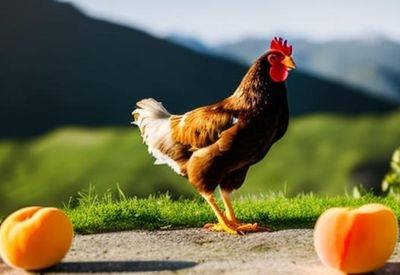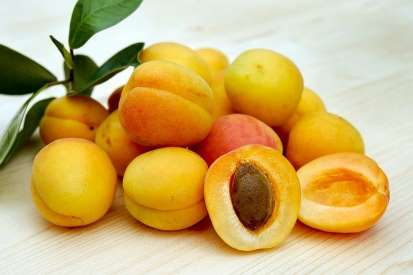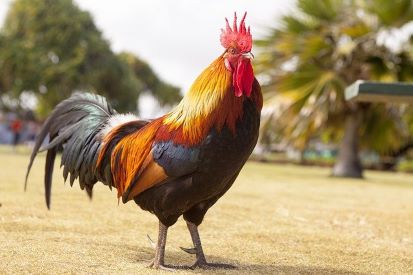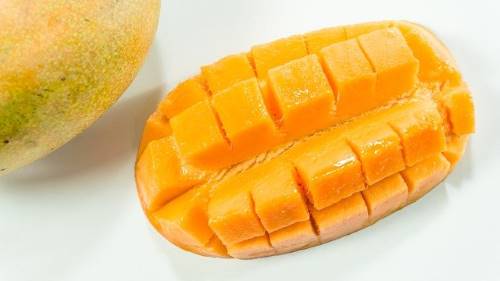Can chickens eat apricots? As chicken owners, we always look for healthy and delicious treats to offer our feathered friends. If you’ve ever wondered whether giving your beloved flock apricots is safe, you’ve come to the right place.
This blog post will dive into the delightful world of apricots, exploring their nutritional value, potential risks, and whether your chickens can safely indulge in this sweet treat. So put on your farmer’s hat, grab a basket of ripe apricots, and let’s begin!

Can chickens eat apricots?
Apricots are not only a tasty and irresistible addition to your chicken’s menu, but they also offer several health benefits. Rich in vitamins A, C, and E, as well as potassium and dietary fiber, apricots provide a healthy dose of essential nutrients that promote overall immune system health, eye health, and digestive well-being.
Furthermore, these delectable fruits contain antioxidants that help protect cells against damage, supporting a healthy flock.
However, with good comes bad. While the fruit part of apricots is perfectly safe for chickens, the leaves and pits are a definite no-go. Why, you ask? The leaves and pit contain the toxin amygdalin, which can release cyanide in the body when ingested.
As you can imagine, cyanide is one sneaky toxin you don’t want your chickens consuming. Therefore, when offering apricots, always remove the pit and steer clear of any contact with the leaves.
[ChickenAffiliate]
The benefits of eating apricots for chickens
Apricots are not just a tasty addition to your diet, but they also have some fantastic benefits for the health and happiness of your chickens. Here are the top five benefits of feeding apricots to your clucking companions, along with some helpful tips on incorporating them into your chickens’ diet.
The Nutrient-Packed Powerhouse
Apricots are loaded with vitamins, minerals, and antioxidants that can boost the overall health of your chickens. High in vitamins A, C, and potassium, these fruits can help strengthen your chickens’ immune systems, maintain good vision, and protect their hearts.
The antioxidants in apricots can also help fight harmful free radicals and reduce inflammation, promoting longevity and wellness in your flock.
Aiding in Feather and Bone Development
Due to their high calcium content, apricots are an excellent choice for promoting strong and healthy chicken bones. Calcium is essential in maintaining the skeletal structure of your feathery friends, preventing rickets and other bone-related issues.
Moreover, the vitamin A found in apricots is known to aid in developing strong, shiny feathers, ensuring your chickens look as gorgeous as they are healthy.
Natural Stress Relief
Believe it or not, your chickens can get stressed too! Just like humans treat themselves to a relaxing snack, the vitamin C in apricots provides natural stress relief for your brood.
What’s more, vitamin C supports the production of collagen, which aids in repairing skin, feathers, and other tissues, ensuring your chickens can recover from any minor injuries and bounce back better than ever.
Improved Laying Capabilities
We know that what chickens eat directly impacts the quality of their eggs. Apricots contain essential nutrients like vitamins and minerals that directly support laying hens.
The high vitamin A and calcium content is particularly beneficial in maintaining the egg production process, resulting in a consistent supply of eggs and higher-quality shells and yolks.
A Fun and Tasty Treat!
Chickens love their treats as much as we do, and apricots are a perfect addition to their menu. Their bright orange color and juicy textures will pique your birds’ interest and make for a fun change from their usual diet.
Watching your chickens chase after a plump apricot rolling around their coop or enclosure is always a delight, providing them with entertainment and mental stimulation.
Things to watch out for when feeding apricots to chickens

Now, you might wonder if it’s safe to feed your beloved chickens these vibrant and tasty fruits. Fear not, for we’ve got all the information you need! Here are three essential points to consider when offering apricots to your flock, helping to ensure their safety and enjoyment of these irresistible treats.
Beware of the Pit
First and foremost, when feeding apricots to chickens, we must begin with a cautionary tale involving the dreaded apricot pit. While the juicy and tender flesh of the apricot can be a delightful treat for your chickens, the pit can be quite dangerous, even lethal.
Apricot pits contain amygdalin, a compound that releases hydrogen cyanide when ingested. As you can imagine, ingesting a toxic substance like cyanide poses a significant health risk to your chickens.
Remove the pits from the apricots to keep your flock safe before offering the fruit as a treat. But fear not, dear chicken caretakers, for once the pits are removed, the fleshy, juicy part of the apricot can be a healthy and delicious snack for your feathered friends, offering an excellent source of vitamins A and C.
Moderation: The Feathery Key to Happiness
As with most treats, moderation is the key to providing apricots as a tasty, nutritious addition to your chicken’s diet. Although apricots provide an excellent source of vitamins A and C, excessive fruit can cause unintentional harm.
Feeding your chickens too much fruit can lead to an unbalanced diet, high in sugar and low in essential nutrients, such as protein, calcium, and other vital minerals in their regular feed. A diet low in protein can lead to stunted growth, molting issues, and decreased egg production.
Therefore, offering apricots and other fruits as occasional treats in small quantities is essential – think of them as the cherry on top of your chicken’s already healthy and balanced diet.
Fresh is Best
Another point to consider when including apricots in your chicken’s diet is the quality and freshness of the fruit. As apricots age and rot, they can develop mold and other harmful bacteria, harming your chickens’ health.
When offering apricots to your chickens, always ensure that you provide fresh, vibrant fruit. If the apricots you have on hand are past their prime, a better option would be to compost them rather than potentially risk the well-being of your flock with a questionable snack.
In addition to providing fresh fruit, remember to clean up any leftovers promptly. Leftover fruit can attract unwanted pests and harbor harmful bacteria, so maintaining a clean feeding area is crucial to your flock’s overall health and happiness.
How often should chickens eat apricots?
When it comes to feeding apricots to your flock, moderation is key. Think of them as the perfect occasional treat, not the main meal. Too much of a good thing can be bad, especially if it leads to an unbalanced diet.
Keep in mind the primary food source for chickens should consist of a high-quality layer feed, providing them with the essential nutrients needed for egg production and general health.
How to prepare apricots for feeding to chickens

So how do you go about introducing apricots to your chickens? Start by offering small amounts of fresh or dried apricots – always with the pits removed. You can even chop or mash the fruit for easier consumption.
Keep an eye on your flock to ensure they’re enjoying their fruity reward without adverse reactions. When picking the perfect apricot, aim for ripe, firm fruits that are not overly squishy or bruised. Remember, good quality fruit means healthier and happier chickens.
Try incorporating apricots as part of a foraging or enrichment activity for extra fun and mental stimulation. Scatter small pieces of apricot around your chicken’s run, encouraging them to scratch, peck, and explore their surroundings.
Your flock will love the tasty adventure, and you’ll be proud to keep them happy and entertained.
Can baby chickens eat apricots?
While it is generally safe for baby chicks to consume apricots, it’s essential to be mindful of the fruit’s water content. As nutritious and enjoyable as apricots may be, ensuring that these fledglings do not overindulge is crucial, as they possess different nutritional requirements than adult chickens.
By providing a balanced diet that includes a controlled quantity of apricots, baby chickens can experience the delightful taste and benefits of the fruit without compromising their growth and overall health. Remember, moderation is vital to maintaining a healthy diet for baby chicks.
What other fruits can chickens eat?

While apricots are a popular treat among chicken owners, many other fruits can also be fed to your favorite flock. Now we will explore other fruits that will make your chickens cluck with joy.
Peaches
Peaches are an irresistibly juicy and delicious treat for your birds, filled with essential vitamins and minerals. Packed with vitamin A, potassium, and dietary fiber, peaches provide your chickens with a range of health benefits.
Just remember to remove the pit, as it can cause choking hazards and even contain small traces of cyanide, which can harm your flock. Consider offering them halved or chopped into small pieces for easy consumption.
Read More: Can Chickens Eat Peaches? 5 Important Benefits
Cherries
Not only are cherries a fantastic source of antioxidants, but they also make a fun and exciting snack for your chickens. However, like peaches, be cautious about removing the pits before feeding them to your beloved birds, as they contain harmful cyanide compounds.
Try cutting cherries into small bits or mashing them up for your flock to enjoy.
Read More: Can Chickens Eat Cherries? 6 Fantastic Benefits
Mangos
Adding a generous helping of mangos to your chickens’ diet will make them feel like they are on a tropical island vacation. Rich in vitamins A, C, and E, mangos offer many nutritional benefits for your feathery friends.
However, as mangos contain high sugar, moderation is key. Remove the skin and the large seed in the middle before serving, and treat your chickens to this fruity feast occasionally.
Read More: Can Chickens Eat Mango? 5 Amazing Benefits
Plums
Another stone fruit that can be fed to your chickens, the plum is a fun and unexpected snack your flock will love. Remember to remove the pits and seeds to protect your birds from harm.
Plums are packed with vitamin C, which can help boost their immune system and overall health. So add a little variety to your chickens’ diet by occasionally tossing them some ripe, juicy plums.
Read More: Can Chickens Eat Plums? 5 Excellent Benefits
Coconuts
Although you might not immediately consider coconuts a suitable treat for your flock, this tropical fruit can be a great addition to your chickens’ diet. Just make sure to remove the tough outer shell and the fibrous husk.
Coconuts are rich in healthy fats and dietary fiber and can help support your chickens’ digestive health. You can offer them small pieces of fresh coconut meat or even share some unsweetened coconut flakes as a tasty snack.
Read More: Can Chickens Eat Coconut? 5 Awesome Benefits
Can chickens eat apricots – final thoughts
In conclusion, apricots are not only a scrumptious and nutritious treat for chickens, but they also provide a wealth of health benefits. If you remove the pit and avoid the leaves, your flock can safely enjoy this fruity delight.
Remember to keep apricots as an occasional treat to maintain a well-balanced diet for your chickens. So go ahead and spoil your little cluckers with a taste of apricot heaven — they will surely be clucking with joy!
Related Articles:
